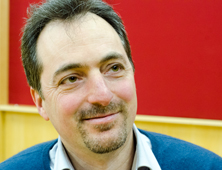Dr Shay Loya has been named as recipient of the prestigious Alan Walker Book Award, a prize funded by the American Liszt Society. Loya’s book Liszt’s Transcultural Modernism and the Hungarian-Gypsy Tradition was chosen from eight monographs submitted for consideration. Michael Short was co-winner of the award for his translation of Correspondence of Franz Liszt and the Comtesse Marie d’Agoult.
Author Archives: sbbd746
Alexander Karpeyev curates Medtner Day at the Guildhall School of Music and Drama
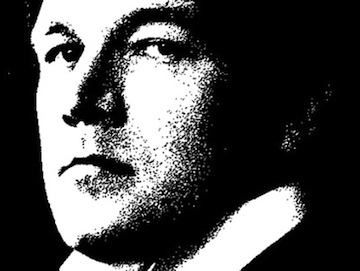 On Thursday 22nd of May, Medtner Day, the first in the UK one-day long festival dedicated to the artistic output of Russian pianist-composer Nikolay Medtner will take place. Musicians from Guildhall School of Music and Drama will be performing solo piano works, songs and chamber music by this enigmatic composer. Having lived in England for the last 16 years of his life, Medtner was well known in the UK through his performances at the Proms and his recordings for the BBC and HMV. The underlying idea of Medtner Day in 2014 is to bring the attention of modern day audiences back to this outstanding artist.
On Thursday 22nd of May, Medtner Day, the first in the UK one-day long festival dedicated to the artistic output of Russian pianist-composer Nikolay Medtner will take place. Musicians from Guildhall School of Music and Drama will be performing solo piano works, songs and chamber music by this enigmatic composer. Having lived in England for the last 16 years of his life, Medtner was well known in the UK through his performances at the Proms and his recordings for the BBC and HMV. The underlying idea of Medtner Day in 2014 is to bring the attention of modern day audiences back to this outstanding artist.
The programme for the Day:
1pm – lunchtime concert
3pm – masterclass by Hamish Milne (RAM)
5:45pm – pre-concert talk by Francis Pott (University of West London)
7pm – evening concert (to include Piano Quintet, Sonata tragica, selection of Tales, songs and Russian Round Dance for two pianos).
Admission is free and no tickets are required. This event is curated by City University DMA student Alexander Karpeyev whose research focuses on performance practise in Medtner. Further information is available here.
Alumnus Interview: Luke Shrewsbury
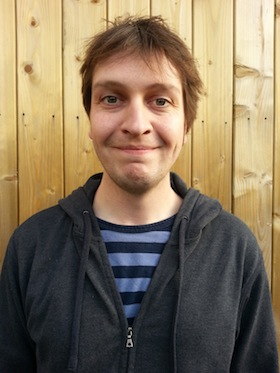 When did you graduate from City and what have you been doing since?
When did you graduate from City and what have you been doing since?
I graduated from City in 2009. I had really enjoyed a huge range of specialisms at City but I had particularly enjoyed Ethnomusicology and Electroacoustic Composition. I’d done a lot of work in ethnomusicology on the social role of music in different ethnic communities living in London and had discovered a passion for talking to musicians and recording sounds/instruments, as well as experiencing other areas of new cultures (mostly food!). Alongside this I was very dedicated to Electroacoustic composition and the manipulation of sounds using new technologies. I became interested in recording, field recording and music recording. The department really ignited this crossover between ethnomusicology and music technology and after I graduated I began using my recording skills to do little jobs in film and documentary. As my passion grew I was briefly involved at Resonance FM and then for a short while I worked at a community radio station in my hometown of Sheffield as well as doing some jobs for BBC radio. I worked on various low-budget short films and sometimes some mid-budget ones throughout this time. I was developing a love for telling stories in sound. This involved music, field recordings and voices and it was a natural progression to pursue this at a more professional level into the world of film and TV where having not only a musical ear, but an ear for a good story and how to tell it is crucial. And naturally, I had been interested in cinema, television and drama for many years. provides a great space to combine a technical interest in technology with the desire to create something more abstract that has emotional content.
I gather you’ve just finished a course at the National Film and Television School. Can you tell us about the course and what you enjoyed most/got the most out of?
The National Film and Television School is a place that nurtured my creative passion and taught me update technical to enter the world of film sound. Its an old institution and the MA course I did there was incredibly exciting and taught me everything about proffessional sound that I know. The School operates as a replica film studio with films being produced, shot and post-produced year round. I worked on various fiction, animation and documentary projects over two years using industry-standard facilities and with visiting tutors who work in film and television.
I had access to very good technology, and very good teaching. It’s very intense – more like a job in post-production facility than a degree course. It also allowed me to become more creative with my field recording, interacting with film makers, mixing and editing sounds. Building on all the things from my undergraduate degree at City University and allowing me to develop myself creatively and technically.
Where are you working now? Can you tell us what your work involves and what you enjoy the most.
I’m currently working on several projects. I’m employed as an assistant sound editor by a production company making a children’s animation series due for broadcast this year on CBeebies. I edit dialogue for them in an office in Camden.
I’m also working on two short films, one is a comedy produced by some friends of mine who hope to get a pilot commissioned for television and the other is a short drama with no dialogue – so I’m having a lot of fun creating atmospheres and recording foleys and Sound FX. Because there’s no dialogue I can be very precise about how a scene sounds because I can replace everything very easily without the need to do expensive voice re-recording.
The other area of work that has opened up is sound design for Video Games. Its a huge industry and its ever-expanding. there are hundreds of indie games out there and they all need creative sound designers to help them out. I’m currently working in development with a small team who have been commissioned by the Wellcome Trust to produce an education science app.
Projects large and small keep getting thrown my way and thats what I enjoy about the job most. I get to meet a huge range of people from a range of disciplines and backgrounds and help them realise their projects using sound and music.
Where do you see yourself in 5 years time? What would your ideal job be?
Right now, as long as the work keeps coming, I’m in an ideal place. I’d like to work on larger feature films and also develop my sound ideas as installations. I love recording and editing sounds so I hope to be doing that in 5 years time.
Cadence EP Launch Event, Saturday 12th April
Third year Music students Roza Kalnins and Micah Rose-Trespeuch have teamed up with other artists – many also from City University London – to put together an event to celebrate the launch of their new EP. Their band ‘Cadence’ has toured the London new music circuit including venues such as 02 Academy Islington, The Water Rats and The 229 Venue. They now join City University’s Rachel Espeute and her band ‘Ask Seek Knock’ along with Fred Lessore, a rising singer/songwriter, to put on a free event at the newly refurbished venue: The Islington. As many of the performers involved are in their final year of studying Music at City, they welcome all to join them in one of the last events they will have as a year group.
Upcoming Conference Presentations by Doctoral student Mark Porter
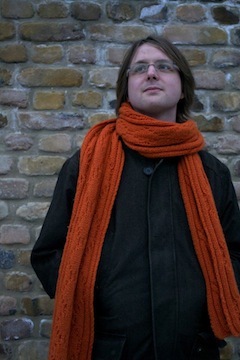 Doctoral candidate Mark Porter has been awarded funding from the City University Graduate School in order to present a paper at the conference of the International Society for Media, Religion and Culture in Canterbury later this year. Mark’s presentation on congregational music and the ‘new cosmopolitanism’ will focus on the application of recent cosmopolitan thought to the understanding of musical dynamics within congregational music.
Doctoral candidate Mark Porter has been awarded funding from the City University Graduate School in order to present a paper at the conference of the International Society for Media, Religion and Culture in Canterbury later this year. Mark’s presentation on congregational music and the ‘new cosmopolitanism’ will focus on the application of recent cosmopolitan thought to the understanding of musical dynamics within congregational music.
In addition to Canterbury, Mark is due to present papers at two further conferences this summer. In April he will present a paper at a joint BFE/RMA study day on music, circulation and the public sphere, focussing on the application of aspects of Jürgen Habermas’ thought to contemporary worship music and in July he will present a paper at the annual conference of the BFE at SOAS focussing on the dynamics of alternative musical spaces within the musical life of a congregation.
City’s Big Band wins Battle of the Big Bands Competition
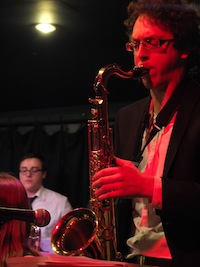 On Saturday 8th March, City University London emerged victorious in the annual Battle of the Big Bands competition. The competition sees some of the best university big bands in London face off against one another. City’s Big Band, founded by music students in 2010, bested the competition with their varied programme, excellent musicianship and energetic performance. They came out ahead of big bands from other London institutions, including Royal Holloway, Kings College London, and Surrey University.
On Saturday 8th March, City University London emerged victorious in the annual Battle of the Big Bands competition. The competition sees some of the best university big bands in London face off against one another. City’s Big Band, founded by music students in 2010, bested the competition with their varied programme, excellent musicianship and energetic performance. They came out ahead of big bands from other London institutions, including Royal Holloway, Kings College London, and Surrey University.
City’s set consisted of a bold mix of contemporary and classic big band repertoire featuring jazz standards ‘Too Close For Comfort’, ‘Body And Soul’ and ‘Witchcraft’ (Arranged by Gordon Goodwin, Bob Florence and Tom Kubis, respectively), ‘Samba Del Gringo’ (A Goodwin original) and a suite of Michael Giacchino’s music from the film ‘The Incredibles’ (Arranged by the band’s own Andy Allen). Highlights included strong solo performances by Ben Smith on piano, Bertie Atkinson on drums, Amy Hollinrake on vocals and the ever-charismatic Nico Seal as the band’s MC.
City University Big Band, currently in it’s fourth year, is open to staff and students, past and present from all departments of the University. With a series of concerts already lined up for the summer and a large selection of exciting new music, the future is looking bright.
Professor John Rink’s Lecture-Recital: ‘Chopin’s Afterthoughts’
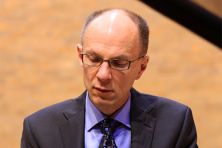 Professor John Rink’s lecture recital, ‘Chopin’s Afterthoughts’, recently given in the Performance Space at City, proved not only to be a fascinating insight into the world of Chopin, but also brought to light many issues relevant to any performer dealing with historical sources.
Professor John Rink’s lecture recital, ‘Chopin’s Afterthoughts’, recently given in the Performance Space at City, proved not only to be a fascinating insight into the world of Chopin, but also brought to light many issues relevant to any performer dealing with historical sources.
As the world of performance continues to develop we must consider more than ever the role of performer within music reception – are we to remain a vehicle in replicating the intentions of the composer as closely as possible, or should we allow more creative, even improvisational sway in our interpretations? It was within this wider debate that Rink situated his talk. Though a series of case studies, various interpretive problems were put forth, based on incongruities between different early editions of Chopin’s music.
Known for never having ‘played his own compositions twice alike’, Chopin seemingly changed his mind on portions of several works post-publication. The upshot of this for Rink is that considering any particular Urtext edition as the ‘right’ one is not only ill-informed, but also jarring with Chopin’s compositional aesthetic.
And so, through examination of the editions, and demonstration at the piano, Rink showed how a mixing of various sources, and even (carefully considered) original improvisation around the score may be regarded as perfectly in tune with Chopin’s compositional approach. As it was put towards the end of the talk, ‘in abandoning fidelity to the letter, we capture it in spirit’.
Professor Rink directs the online resources Chopin’s First Editions Online and the Online Chopin Variorum Edition. See also Rink’s The Virtual Chopin on YouTube.
— Ben Smith and Josie Ellis
London Contemporary Music Festival: The Music of Bernard Parmegiani, 20-23 March
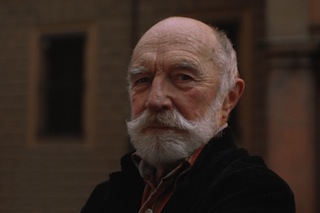 The Department of Music is happy to be supporting a major event organised by the London Contemporary Music Festival, themed around the music of Bernard Parmegiani.
The Department of Music is happy to be supporting a major event organised by the London Contemporary Music Festival, themed around the music of Bernard Parmegiani.
The Department enjoys close ties with the festival via the involvement of several of its staff and students: among the performers are Professor Emeritus Denis Smalley, lecturer Diana Salazar, and former PhD students Peiman Khosravi and Ambrose Seddon. The festival is co-directed by PhD student Sam Mackay, and the acoustic consultant is PhD student Georgia Rodgers. As with the inaugural edition of LCMF in 2013, the Department is making available some of its cutting edge sound equipment.
The upcoming series marks the UK’s first major retrospective of the music of Bernard Parmegiani, the legendary French electro-acoustic composer who died in November 2013. For this series LCMF takes over a 20,000 sq ft former carpet factory near Brick Lane.
Parmegiani’s rich body of work, spanning nearly 50 years, stands as among the most important in electronic music, influencing generations of artists within the academy and beyond. Colleagues from the renowned Groupe de Recherches Musicales (GRM) will be among those diffusing his music, rendering it in vivid sonic detail and demonstrating what Parmegiani meant when he said sound was “like a living being”. Alongside his acclaimed acousmatic pieces such as ‘La Création du Monde’ and ‘Dedans dehors’, the three-day series features guest performances from artists touched by Parmegiani’s broad influence, including Florian Hecker, Rashad Becker, and Vessel.
20 -23 March: The Music of Bernard Parmegiani
Britannia House, 68-80 Hanbury Street , E1 5JL
http://lcmf.co.uk/
Tatjana Goldberg selected for 3minute Thesis Competition
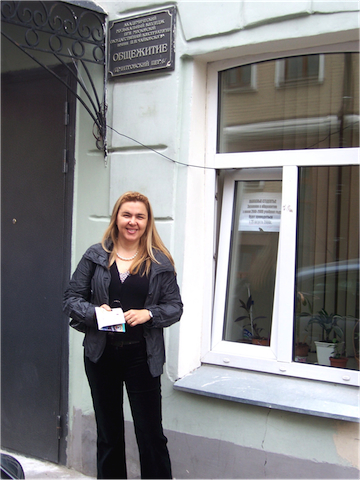 Yugoslavia-born violinist Tatjana Goldberg is currently in the final year of a PhD at City University London, supervised by Ian Pace. She has been chosen to participate in the first of this year’s university-run 3minute thesis competition (3MT) on 27th March 2014.
Yugoslavia-born violinist Tatjana Goldberg is currently in the final year of a PhD at City University London, supervised by Ian Pace. She has been chosen to participate in the first of this year’s university-run 3minute thesis competition (3MT) on 27th March 2014.
The competition was originally devised at the University of Queensland, Australia to encourage research students to develop their communication skills in order to explain the essence of their research to a non-specialist audience using non-technical language.
Tatjana’s research is about women violinists of the late 19th and early 20th centuries, with a particular focus on the careers of three artists: British violinist Marie Hall, Australian-born Alma Moodie and American Maud Powell. Many accounts of the development of Western violin playing focus almost entirely upon male virtuosi and the achievements of important female violinists are often neglected or forgotten. Tatjana’s research assesses the significance of these three pioneer violinists in the development of the solo recital, and also considers their contribution to the history of early recordings and their role in promoting contemporary works of the late 19th and early 20th centuries. Since musical patriarchy still exists to some extent, she maintains that many of the issues that affected these and other women musicians continue to require rigorous interrogation.
After receiving her MA at the Moscow Conservatoire, Tatjana Goldberg performed widely as a soloist and as second leader of the Orchestra Sinfonica Brasileira. She started her PhD at City University in 2010 and was the recipient of the 2013 Mercers’ Award for her performance of the Wieniawski Violin Concerto with the City University Symphony Orchestra at LSO St Luke’s in 2013.
Recent activity and publications by PhD student Liam Cagney
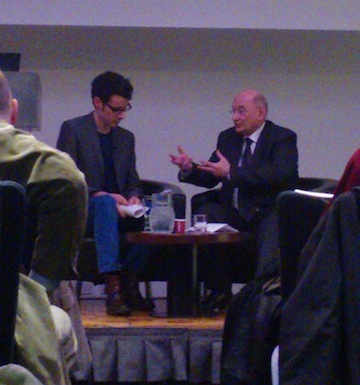 On Wednesday 22 January, PhD student Liam Cagney was invited by the BBC Symphony Orchestra to introduce a concert at the Barbican focussing on contemporary French music. During his pre-concert talk Liam interviewed the composer Hugues Dufourt onstage in the Barbican’s Fountain Room, discussing Mr Dufourt’s new piano concerto On the Wings of the Morning, the meaning of the name ‘spectral music’ which Mr Dufourt coined back in 1979, and the influence of painting on aspects of Mr Dufourt’s musical style.
On Wednesday 22 January, PhD student Liam Cagney was invited by the BBC Symphony Orchestra to introduce a concert at the Barbican focussing on contemporary French music. During his pre-concert talk Liam interviewed the composer Hugues Dufourt onstage in the Barbican’s Fountain Room, discussing Mr Dufourt’s new piano concerto On the Wings of the Morning, the meaning of the name ‘spectral music’ which Mr Dufourt coined back in 1979, and the influence of painting on aspects of Mr Dufourt’s musical style.
Liam recently travelled to Salzburg in Austria to interview the composer Tristan Murail, and will soon go to Basel, Switzerland, to spend two months studying the Gérard Grisey Collection at the Paul Sacher Foundation.
Liam has also had some recent publications. The January issue of the journal Tempo features a review article by Liam on the music of Fausto Romitelli. In creative writing, Liam had a short story published in the winter issue of Irish literary journal The Moth; a short story in the New Island Anthology of new Irish writing, New Planet Cabaret; and will have a short story included in relaunch issue of the journal The Honest Ulsterman, which previously published early work by Seamus Heaney, Paul Muldoon and other Irish writers.

